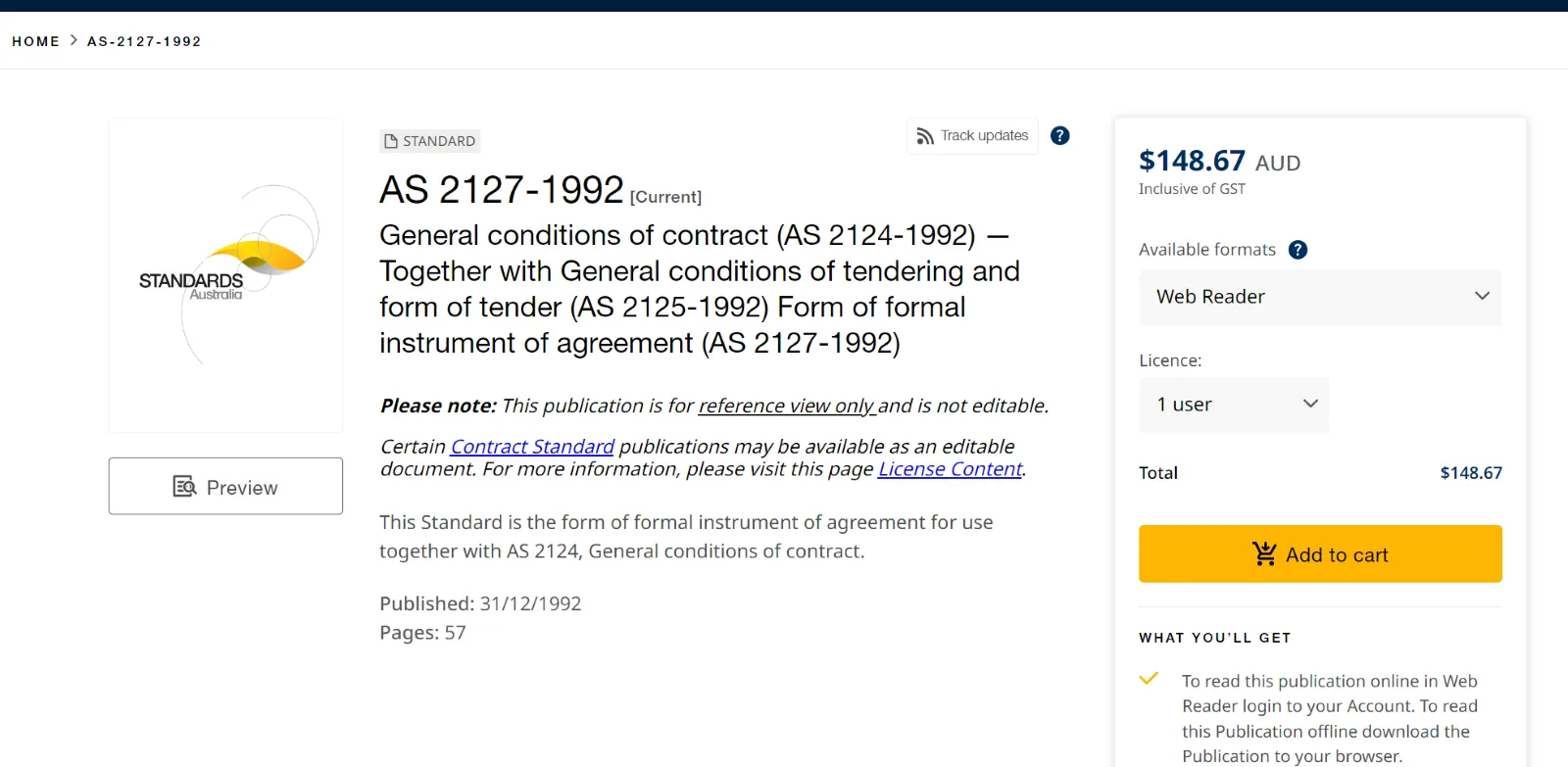It is a common practice in the Australian construction industry to adherence to standard contractual frameworks such as those provided by Standards Australia.
The AS2124-1992 General Conditions of Contract, commonly called AS2124 or AS2124-1992 (or simply AS2124, AS2124-1992), is a well-used contract throughout the construction industry but is super old.
How old, you asked? You can check out our blog on 'Why is AS2124 - 1992 so old?' You'd be surprised to see a rather familiar tech icon in comparison to how old it is!
What is AS2124?
The AS2124 contract is a set of general conditions for construction contracts developed by Standards Australia. You can purchase a copy of the AS2124 here. The flexibility and comprehensive nature of AS2124 means it can cater to various projects, from infrastructure to buildings, and it often operates at a fixed price/lump sum. Though heavily amended, AS2124 is usually the preferred legal document by different governmental departments.

AS2124 is generally considered a contract involving risk for the Contractor and the Project’s Owner however, when amended, the risk can swing in either direction. The parties to AS2124 are
- The Principal (the party commissioning the construction project, i.e. the Project's Owner);
- The Contractor (the party undertaking the construction work, which they call 'WUC' - work under the Contract).
How the parties then interact through the legal and procedural aspects of executing construction projects, including the roles and responsibilities of the contracting parties, procedures for administering the contract, and mechanisms for dealing with common issues such as variations, time extensions, payments, and dispute resolution, are all handled by AS2124. It looks like many emails and letters are being sent to each other.
What is Superintendent in AS2124?
Overall, the contract is neutral and does not inherently favour either party but can be risk-adjusted in either direction (to the principal or the contractor) and its administration depends heavily on the Superintendent. AS2124 is administered by this third role, the Superintendent, who should be aiming to foster fair dealing and efficiency in executing construction projects.

Basic Features of AS2124
- Risk Allocation: AS2124 specifies how various risks associated with the construction project are allocated between the owner (principal) and the contractor. This includes risks related to construction delays, cost overruns, and unforeseen site conditions. Risks generally occur and cost money, so it's good to divvy them up.
- Contract Administration: The standard outlines the administrative processes and documentation required for managing the contract, including notices, submissions, and approvals necessary for smooth project execution. A lot of administrative notices used to occur over fax; however, now email and systems like Aconex and Mastt are well used.
- Variations: AS2124 includes provisions for managing variations to the contract scope, allowing for adjustments to be made to the works, contract sum, or project duration as required by changing circumstances.
- Time Extensions: It specifies the conditions under which the contractor is entitled to an extension of time for completing the works, addressing delays caused by unforeseen events or changes initiated by the owner.
- Payment Terms: The standard sets out the terms for certifying and making payments to the contractor, including progress payments, retention amounts, and the final payment process.
- Dispute Resolution: AS2124 provides mechanisms for resolving disputes that may arise during the project, including mediation, arbitration, or litigation processes.
- Quality and Defects: The standard addresses requirements for the quality of the works and the contractor's obligations to rectify any defects identified during or after construction.
Payment Under AS2124
Payment claims are a key feature of AS2124 under Clause 42: Certificates and Payments. Clause 42 outlines how a contractor can seek 'claims for payment' for the value of work completed to date under the terms of the contract.
Submission of Payment Claims
"At the times for payment claims stated in the Annexure and upon issue of a Certificate of Practical Completion and within the time prescribed by Clause 42.7, the Contractor shall deliver to the Superintendent claims for payment supported by evidence of the amount due to the Contractor and such information as the Superintendent may reasonably require."
Nice and long sentence, isn't it? In AS2124, they call it a Payment Claim. In AS 4000, as Progress Claim. Same thing! The submission must follow the format and requirements specified in the contract, including any necessary documentation to support the claim.
Certifying of Payment Claims
Upon receipt of a progress claim, the superintendent must respond.
"Within 14 days after receipt of a claim for payment, the Superintendent shall issue to the Principal and to the Contractor a payment certificate stating the amount of the payment 20, which, in the opinion of the Superintendent, is to be made by the Principal to the Contractor or by the Contractor to the Principal."
In assessing the payment claim, the superintendent must set out (in the certificate) the calculations they used to arrive at the amount. If the amount is more or less than the amount claimed by the contractor, the superintendent must outline the reasons for the difference. As is often the case, if no payment certificate has been issued, the Principal shall pay the amount of the contractor's claim.
One interesting element is that If the contractor fails to make a claim for payment under Clause 42, the superintendent may issue a payment certificate. I wonder how many times that has been used?
Payment
Payment under AS2124 has two levers, which is earlier of either:
- "Within 28 days after receipt by the Superintendent of a claim for payment" or
- "Within 14 days of issue by the Superintendent of the Superintendent's payment certificate."
Interestingly, there is no mention of an invoice. So, I guess we just have to rely on the contractor to issue one. Or maybe there were no invoices in 1992?
Reporting on AS2124
Mastt provides a comprehensive platform designed to enhance Contract Administrators on capital projects using AS2124. Here’s how Mastt can assist:
- Dashboards and Reporting Automated: Mastt's dashboard offers a centralized view of all project activities, helping project managers track progress and manage tasks effectively.
- Documentation and Tracking: The platform provides tools for documenting and tracking all project-related information, ensuring that everything is recorded and managed systematically.
- Contract Management & Administration: Mastt allows Project Managers to digitally administer Standard Form Contracts like AS4000, AS4300, AS4902, AS2124 and Defene Standard Form Contracts to automate Payment, Variation and other clauses.
- Security of Payments Act: Mastt provides compliance tools to ensure Payment Claims and Payment Certificates are compliant with SOPA.
- Budget & Forecasting: Mastt helps project managers stay on top of budgets and cash flow forecasting by providing real-time insights and analytics.
- Risk Management: By offering robust risk management tools, Mastt enables construction managers to identify and mitigate risks early, ensuring projects stay on track.
- Stakeholder Collaboration: Mastt enhances communication and collaboration between the project owner, contractors, and other stakeholders, ensuring that everyone is aligned and informed.

Conclusion
Despite being created in 1992, the AS2124 general conditions of contract is still a well-used contract (though, at times, heavily amended) for managing construction projects in Australia under lump sum. Since 1992, there have been several changes to the law, and client side project managers acting as superintendents should stay across special conditions often appended to AS2124 that accommodate legislative changes that have occurred since the first publication of AS 2124 such as GST, security of payment, work health and safety and more.
Further reading on AS2124 Contracts and Project Control Groups
Standard Form Construction Contracts are often an agenda item on Project Control Group meetings and within PCG Reports. Learn more about everything PCG related below.
- What is a Project Control Group? Understanding the Role of PCG in Capital Project Management
- The Best PCG Report for PCG Meetings in 2024
- What to Include in a PCG Report (Traditional)
- What to Wear to a PCG Meeting: A Guide for Client Side Project Managers





.webp)






.webp)

.webp)
